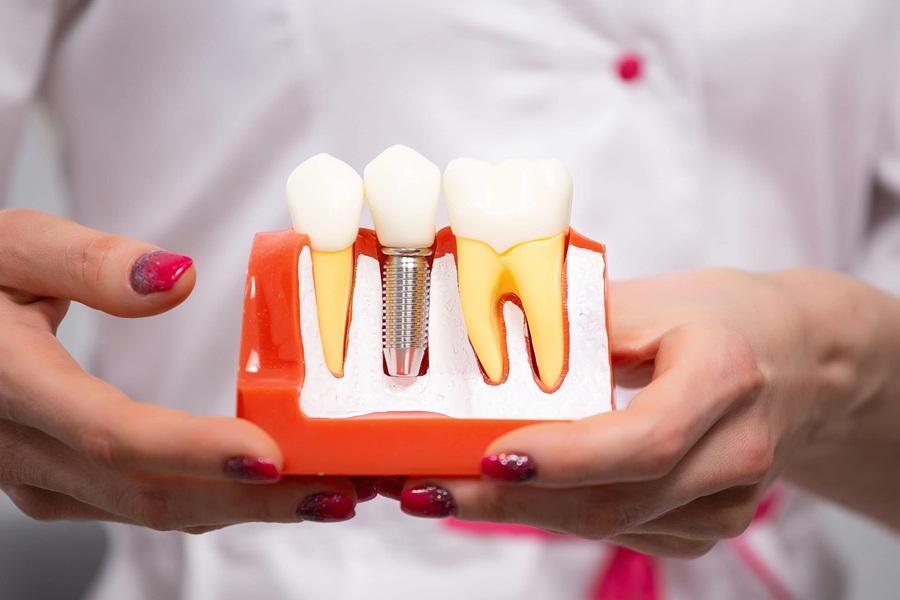
Missing teeth can be stressful since it leads to compromised oral health and appearance. Having untreated missing teeth can predispose you to several other dental issues that may eventually require extensive dental procedures. To overcome such challenges dentists offering dental practice in Lawrenceville, GA provides dental restorations such as dental implants.
Dental implants are a popular solution for replacing missing teeth, but like any medical procedure, they have specific indications, contraindications, benefits, and aftercare requirements. To know everything about dental implants, read this comprehensive blog.
What are dental implants?
Dental implants are a revolutionary solution for replacing missing teeth, offering a natural-looking and permanent solution for restoring oral function and aesthetics. These tiny titanium posts are surgically inserted into the jawbone, where they integrate with the surrounding tissue, providing a sturdy anchor for a crown or bridge. With a success rate of over 95%, dental implants have become the gold standard for tooth replacement, offering numerous benefits, including improved chewing and speaking abilities, enhanced confidence, and preservation of surrounding bone and teeth.
When are dental implants indicated?
The indications for dental implants include:
- Missing one or more teeth due to decay, trauma, or gum disease.
- Unstable or loose dentures or bridges.
- Tooth loss due to injury or accident.
- Congenitally missing teeth ( teeth that never developed).
- Failed root canal or dental restoration.
- Tooth extraction due to periodontal disease or decay.
- Desire for a permanent, natural-looking solution.
- Sufficient bone density and healthy gums to support the implant.
- Need for a dental implant-supported denture or bridge.
- Improved oral function and aesthetics.
- Boosted confidence and self-esteem.
- Replacement of a single tooth or multiple teeth.
- Support for a removable partial denture.
- Enhancement of chewing and speaking abilities.
- Prevention of bone loss and facial sagging.
When are dental implants contraindicated?
The contraindications for dental implants include:
- Insufficient bone density or volume.
- Uncontrolled diabetes or gum disease.
- Smoking or tobacco use (increases the risk of implant failure).
- Radiation therapy to the jaw.
- Certain medical conditions (e.g., bleeding disorders, immunosuppression).
- Poor oral hygiene and inadequate maintenance.
- Inadequate space for implant placement.
- Proximity to nerves or sinuses.
- Teeth grinding or clenching habits (bruxism).
- Unrealistic expectations or unwillingness to follow aftercare instructions.
- Age (children and adolescents with developing jaws).
- Pregnancy or breastfeeding (hormonal changes may affect implant integration).
- Active infection or abscess in the proposed implant site.
- Severe jaw atrophy or bone loss.
- Certain medications (e.g., bisphosphonates, which can affect bone healing).
What are the benefits of dental implants?
There are several benefits of dental implants. They:
- Mimic natural teeth, restoring aesthetics and functionality.
- Enable comfortable chewing and clear speech.
- Enhance the appearance and overall quality of life.
- Can last a lifetime with proper care.
- Prevent bone loss and tooth migration.
- Eliminate the need for removable dentures or bridges.
- Are easier to clean and maintain than traditional dentures.
- Can support a single tooth, multiple teeth, or a full arch.
- Eliminate discomfort and irritation caused by dentures or bridges.
- Improve nutrition and overall well-being.
- Require minimal upkeep and care.
- Have a success rate of over 95%.
- Stimulate bone growth and prevent resorption.
- Restore natural tooth shape and appearance.
- Improve daily activities, social interactions, and overall well-being.
What does aftercare for dental implants involve?
Aftercare for dental implants must involve the following:
- Rest and strenuous activities
- Take prescribed medications
- Follow a soft food diet for 1-2 weeks
- Avoid smoking and tobacco products
- Practice gentle oral hygiene (brushing, flossing)
- Attend regular dental check-ups
- Avoid excessive force or trauma to the implant
- Use warm water salt rinse for 2-3 days
By understanding the indications, contraindications, benefits, and aftercare requirements for dental implants, individuals can make informed decisions about their oral health and enjoy a successful, long-term outcome. Consult a dental professional for personalized guidance and care.


